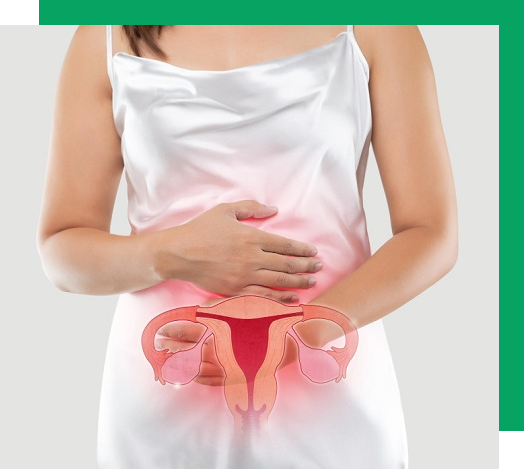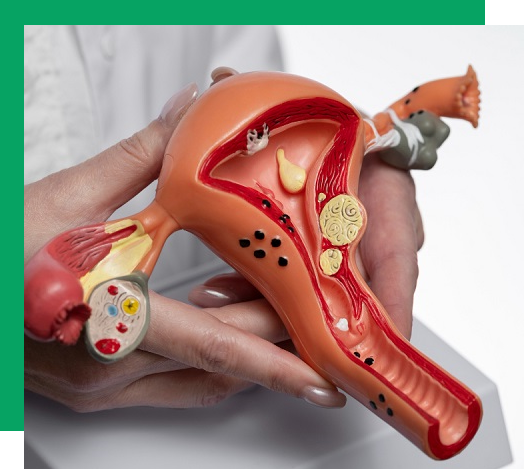What is PCOD/PCOS?
Symptoms:
- Less regular (more or less frequently) menstrual cycles.
- More hair growth than usual on the back, stomach, and face.
- Acne or pimples.
- Emotional issues (depression or anxiety).
- Simple weight gain or challenging weight loss.
- Delay in pregnancy, etc.

Take the PCOS Quiz to assess your Symptoms
India's Top Nutritionists and Dietitians Team
Do you find it difficult to lose weight? Our team of skilled nutritionists and dietitians is committed to assisting you in achieving your weight loss objectives in a healthy and long-term manner. We are aware that every person’s body is different and that weight loss calls for a customized strategy. Because of this, we create your diet plan to suit your specific requirements and tastes. We offer a positive, individualized diet that is based on scientific research and an approach that is successful for your symptoms of any kind of therapeutic condition.


How Does PCOD/PCOS Affect Women?
Getting pregnant can be tricky for them because of hormone issues. In short, PCOD/PCOS can change how a woman's body works, affecting her periods, looks, and chances of having a baby. Women who consume foods that are heavy in sugar, starch, and saturated fat and who are inactive are more likely to develop PCOS or PCOD. These foods can sometimes lead to an increase in blood sugar levels in the body and could reduce the capacity of cells to absorb blood sugar.

Body Analysis

Creating a Diet Plan

Monitoring Your Progress
Our Personalized Meal Plans For PCOD/PCOS Patients Are:
- Low-balanced GI diet.
- Based on body composition analysis (BMI, amount of fat against muscle, etc.).
- Based on the client's way of life
- Planned with consideration for a thorough medical background.
- Include both your indulgent meals and favourite dishes.
- Focuses on general health.
- Only Real and Natural Foods Included.
- Simple to Follow.
DietnCure’s Dedicated Nutritionists Manage PCOD /PCOS Naturally
- Our dietician is aware of the ideal diet for your body.
- Experience matters while making dietary changes.
- We provide you with psychological support because handling it is not difficult.
Foods to Avoid if You Have PCOS/PCOD
- Sugary drinks
- Fried foods
- Processed meats (sausages, hamburgers, and hot dogs)
- Refined Carbohydrates (white bread, pasta, and pastries)
- Processed food (cakes, candy, sweetened yogurt, ice creams with excess sugar)
Foods to Add to Your Diet
- Fatty fish
- Broccoli and cauliflower
- Legumes and lentils
- Leafy greens
- Nuts& seeds
- Dark chocolate in moderate quantities
- Berries
- Spices
Daily Meal & Activity Tracker
Our app makes it easy to keep track of your progress and make sure you don't stray from your goals for losing weight.
Recipes & Tips to Be Fit
You can improve your eating habits by choosing from a variety of healthy recipes. These meals will help you stay healthy a sense of wellness all day long..
Chat Support
The app provides one of the best chat support options for customers with a nutritionist who can explain things, make things clearer, and respond to inquiries.
Book an Appointment Directly
You can easily book an appointment by just providing basic personal information and our nutritionist will reach you soon.
Story Of Success









FAQs
Patients with PCOS crave sugar. This is a result of elevated insulin levels. A pancreatic hormone called insulin aids in the use of glucose by cells as an energy source. PCOS women who are insulin-resistant may have a sweet tooth.
Fruit contains dietary fibre, water, vitamins, and minerals. Fructose sugar is found in fruit. Consuming fruit increases insulin and blood sugar levels.
When you fast intermittently, you can only eat from a set time in the day (for example, from 10 a.m. to 6 p.m.). A calorie deficit caused by intermittent fasting helps people lose weight and reduce insulin resistance, according to conflicting evidence.
Weight gain is a side effect of PCOD/PCOS. Our goal for weight loss in PCOD/PCOS recipients is often 3 to 4 kg each month. Every person is unique, though; some may lose more than this while others can only drop two kilograms per month. Therefore, after reviewing the whole medical and nutritional history, we often decide the aim.





